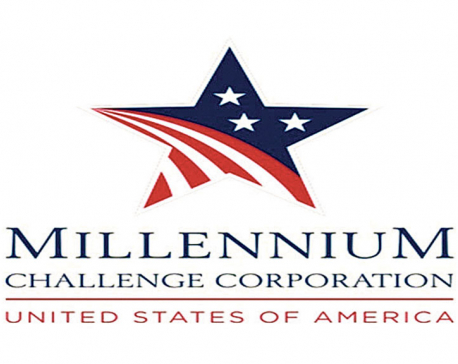
OR
Parties sharply divided along ideological lines over MCC
Published On: February 12, 2020 08:12 AM NPT By: Ashok Dahal | @ashokpillar
KATHMANDU, Feb 12: As the debate over the $500 million US grant under its Millennium Challenge Corporation (MCC) rolls on, major political actors in the country appear sharply divided along the ideological lines of their respective parties rather than over the substance of the compact.
While all right-leaning parties stand in favor of endorsing the MCC without any further delay, most leftist forces in the country have warned the government against endorsement.
The ruling Nepal Communist Party (NCP) was forced earlier to form a panel to study the agreement before taking an official decision following failure to forge a consensus. The grant agreement is still stuck in parliament.
Ironically, top leaders within the NCP are also divided between former CPN-UML and former CPN (Maoist Center), with a few exceptions.
Nine leftist parties including the Mohan Baidya-led CPN Maoist (Revolutionary) on Tuesday submitted a memorandum to lower house Speaker Agni Prasad Sapkota, demanding that the MCC not be endorsed by parliament.
A senior leader of Baidya-led party, CP Gajurel, urged Sapkota to reject MCC, arguing that the agreement will allow the US to include Nepal under its military strategy. “The MCC is part of the Indo-Pacific Strategy under the name of a grant,” insisted Gajurel, while submitting the memorandum.
Other leftist parties in parliament including Nepal Workers Peasants Party and Rastriya Janamorcha have also stood against MCC. Most of the parties or party leaders opposing MCC also suspect that it is linked to the US-led Indo-Pacific Strategy (IPS).
A section of scholars in Nepal see IPS as part of US-led moves to contain the rise of China.
However, those supporting the MCC argue that it offers an important opportunity for Nepal to build much-needed roads and power transmission lines. Raising unwarranted controversy over it could further delay such crucial infrastructure from materializing.
The main opposition Nepali Congress (NC) and pro-monarchist Rastriya Prajatantra Party have demanded early endorsement of MCC from parliament even as some leftist parties have taken to the streets against the grant scheme.
“Communist parties may have traditional suspicions toward the US. Of course, not all leftist parties are against the MCC. But some who still harbor the traditional communist reservations have stood against it,” said political analyst Krishna Pokhrel. “Even in the ruling party, some who do not buy the prime minister’s pitch seem to be against.”
Pokhrel said that the remarks from some US officials that MCC was part of IPS have hardly helped. “Our political parties should check the official documents instead of just taking in what some US officials said,” he argued.
Some other political parties including Samajbadi Party and Rastriya Janata Party Nepal have not taken a clear position.
Although his party remains mum over the issue, former prime minister Baburam Bhattarai, who is also chairperson of the Samajbadi Party, said last month that there should be a thorough debate in parliament. Another emerging political force, Sajha Party, has demanded revision on a few provisions of the MCC agreement before its implementation.
MCC veep concludes consultation visit
Vice President for Europe, Asia, Pacific and Latin America of the Millennium Challenge Corporation, Jonathan Brooks, concluded his visit to Kathmandu on Tuesday.
The five-day visit was a part of on-going consultations in support of the US partnership with the government of Nepal and the $500 million MCC compact, according to a statement issued by the US embassy in Kathmandu. The visit of MCC Vice President Brooks came amid the major political parties in the country standing sharply divided whether or not to endorse the grant agreement through parliament and expedite its implementation.
During his visit, Brooks met separately with the Millennium Challenge Account-Nepal (MCA-Nepal) board of directors, which is already laying the groundwork for the implementation of the MCC, Prime Minister KP Oli, and other high-level government officials involved with the compact. He noted the government’s statements of commitment to moving forward with the compact expeditiously.
Created in 2004, MCC provides time-limited grant assistance to developing countries that meet rigorous standards. In September 2017, the United States and the government of Nepal signed the MCC Nepal Compact, the first in South Asia. “The compact is designed to reduce poverty, spur economic growth and private sector investment, open new markets to grow the economy, and enhance regional cooperation to create sustainable development to benefit the people of Nepal,” said the embassy statement.
You May Like This

NCP’s MCC study panel seeking deadline extension
KATHMANDU, Feb 12: A committee formed by the ruling Nepal Communist Party (NCP) to study whether an agreement on a... Read More...

NCP seeks consensus on MCC
KATHMANDU, Jan 31: As the ruling Nepal Communist Party (NCP) continues to be divide over the $500 million US grant,... Read More...

NCP meeting prolonged as some leaders seek clarity on MCC grant
KATHMANDU, Dec22: The standing committee meeting of the ruling Nepal Communist Party has been prolonged after top leaders couldn’t make... Read More...

Just In
- World Malaria Day: Foreign returnees more susceptible to the vector-borne disease
- MoEST seeks EC’s help in identifying teachers linked to political parties
- 70 community and national forests affected by fire in Parbat till Wednesday
- NEPSE loses 3.24 points, while daily turnover inclines to Rs 2.36 billion
- Pak Embassy awards scholarships to 180 Nepali students
- President Paudel approves mobilization of army personnel for by-elections security
- Bhajang and Ilam by-elections: 69 polling stations classified as ‘highly sensitive’
- Karnali CM Kandel secures vote of confidence


















Leave A Comment